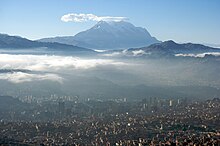The impact of free and accessible information, the core values of the Wikimedia Foundation, can be felt around the world. For example, children and students in South Africa are clamoring to get information on Wikipedia they otherwise could not access [1], people in countries like India, Belgium and Ukraine are rediscovering their countries’ natural and cultural heritage Wikimedia Commons thanks to competitions like Wiki Loves Monuments and Wiki Loves Earth, and books, records and information that were hardly accessible before are now becoming available all over the world.
In Bolivia, however, many barriers remain. Bolivia has one of the most expensive and slowest Internet services in Latin America. With a population of 10.3 millon, only 30 percent of the Bolivian population has access to the Internet, mostly at a connection speed less than 0.256 megabits per second (mbps) or indirectly from their work or at Internet cafes (cabins). For a connection speed of 1 mbps, the average Bolivian would have to spend about $60 USD per month, the equivalent of 35 percent of the country’s monthly minimum wage. [2]
Like in other developing countries, in Bolivia there are also limitations on information and communications technology, given the the way copyright laws are applied. This not only impedes the development of Bolivian society, but challenges its citizen’s rights to access to free knowledge, freedom of speech and free information.[3]
Despite this, the community of Wikipedians in Bolivia has strived to spread the vision of free and open knowledge and to improve Bolivian culture through Wikimedia Foundation projects.
Bolivia has a rich and diverse culture. Its history and ancestral knowledge are nourished from Aymara, Quechua and Guaraní roots, as well as many other indigenous origins, each one with its own traditions, beliefs and languages. To this end, the Bolivian Constitution recognizes 36 nations and indigenous peoples[4].
The group of Bolivians seeking to become an official Wikimedia chapter works to spread and promote the diversity of Bolivian culture, providing its residents access to information and knowledge, as well as awareness about the benefits that Wikipedia and its sister projects represent for their country’s development.
Like in other parts of the world, the Wikimedia community in Bolivia knows firsthand how copyright law can hinder and often prevent the spread knowledge in society.
In March of this year, Bolivia approved a draft of a law that would have required a copyright symbol on each and every publication, in any format. In addition, authors would have been required to complete forms and obtain permits from different government institutions for the publication of any work.
This triggered a protest through social networks and across the Internet, calling on the government to modify the legislation. Free culture activists collaboratively drafted a letter asking for comments and suggestions on the law, and for the addition of copyleft/open content licenses, Creative Commons and the redefinition of the public domain in Bolivian law. Signatures were collected online and the letter was presented to authorities.
During the public consultation to discuss the project in the Committee of the Bolivan Senate, one of the members of the Working Group of Wikimedia Bolivia explained the principles and values of free and open culture, based on the legal right of society to free access to information and the right of authors to publish and authorize the publication and dissemination of their works freely for the benefit of society. [5]
The rapid response to the law resulted in a concession so that the “Law of Books and Reading” now includes an article that preserves the rights of those who voluntarily wish to publish, in any format, books or publications for the free access and circulation to the public…
So, for now, Bolivians can still write and collaborate in Wikipedia and on similar projects without having to worry about getting a permit from the authorities before publishing online.
Justin Duranboger, Bolivian Wikimedian
Notes
- ↑ There are many examples of it, one of the most compelling is the case of the students in South Africa. See https://diff.wikimedia.org/2013/06/19/movement-for-free-access-to-wikipedia-south-africa/
- ↑ See https://www.masymejorinternet.org.bo/enterate/bolivia-sigue-con-el-internet-mas-caro-y-lento-de-la-region/ y https://www.asesorespecial.com/index.php/articulos/29-presente-y-futuro-de-internet-en-bolivia
- ↑ In Bolivia the Official Gaceta, the institution responsible for the dissemination of laws included a prohibition that forbade the reproduction of information from all its publications. See http://compartir-cultura.blogspot.com/2013/02/derechos-de-autor-vs-derechos-ciudadanos.html
- ↑ See the Bolivian Constitution, Sectión 5
- ↑ For more information about the campaign see https://bolivianueva.blogspot.com/search/label/copyright

Can you help us translate this article?
In order for this article to reach as many people as possible we would like your help. Can you translate this article to get the message out?
Start translation

